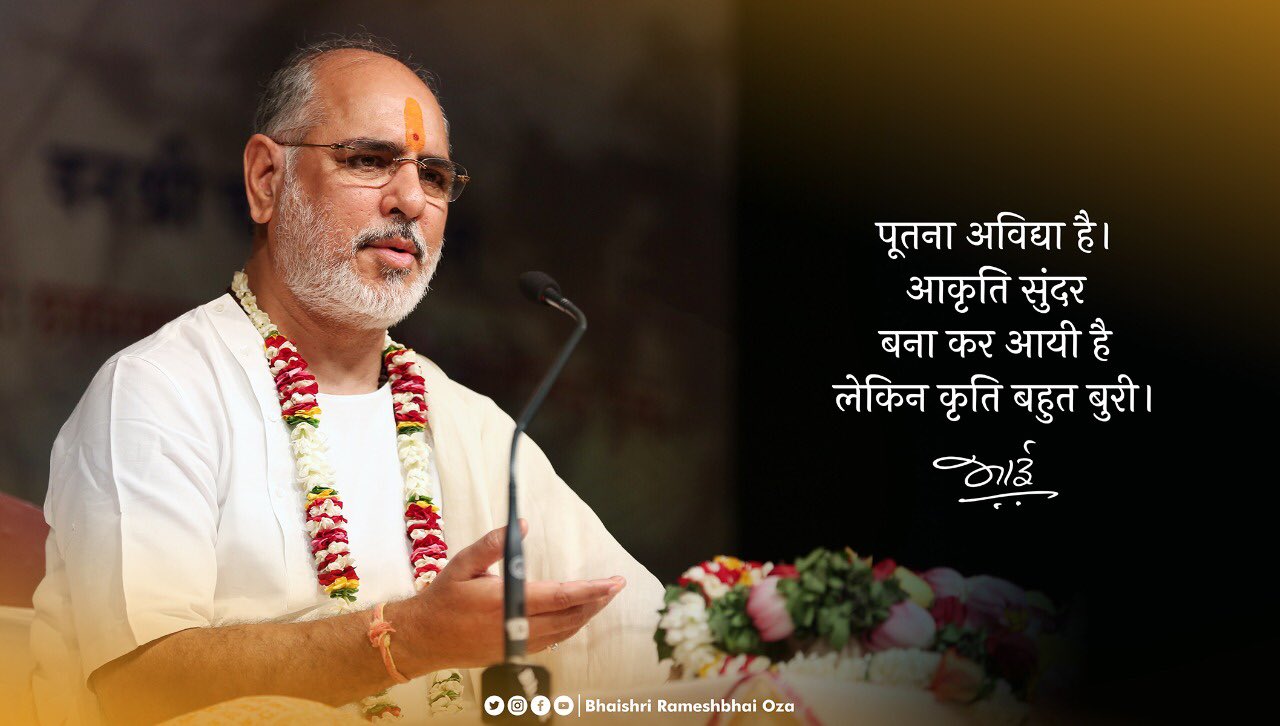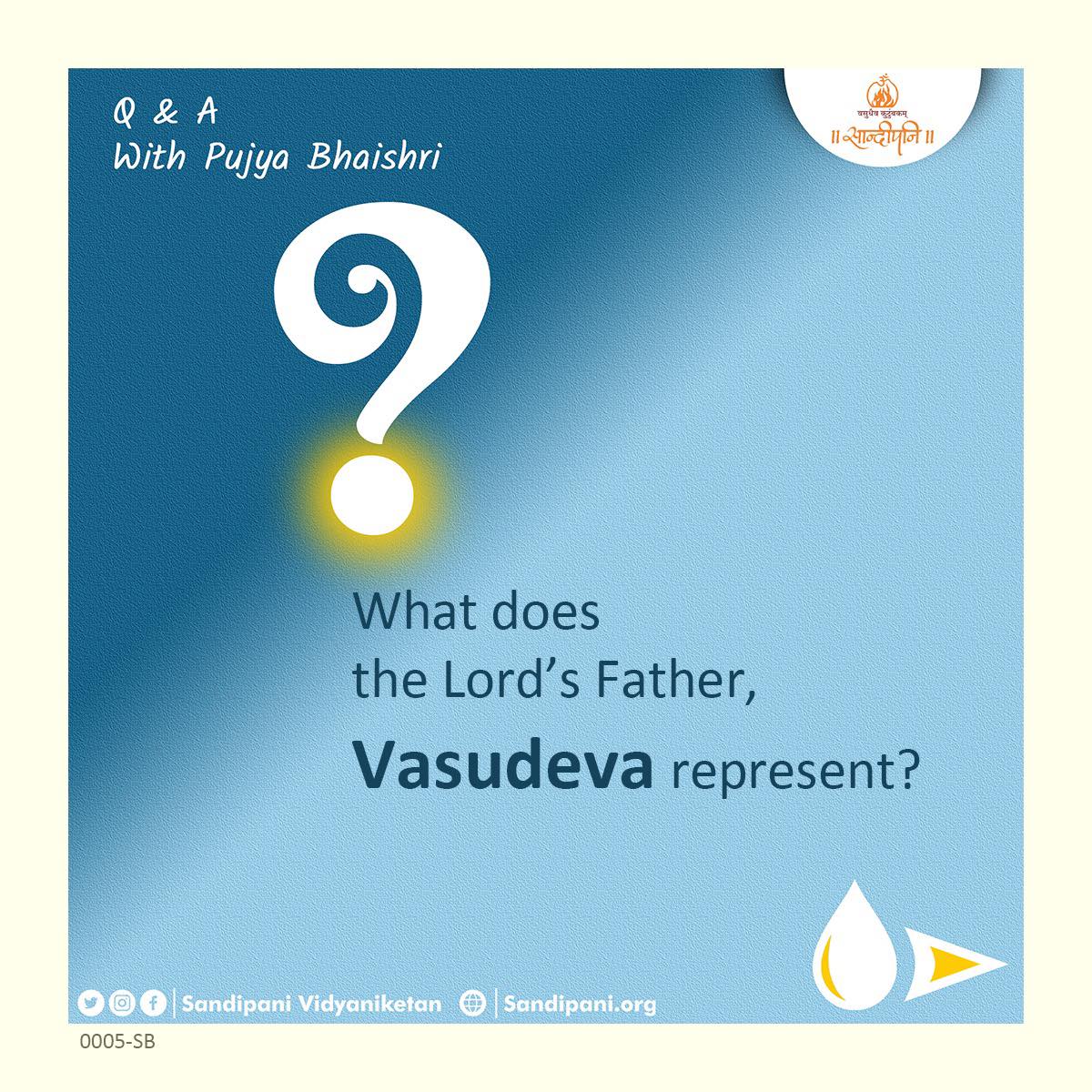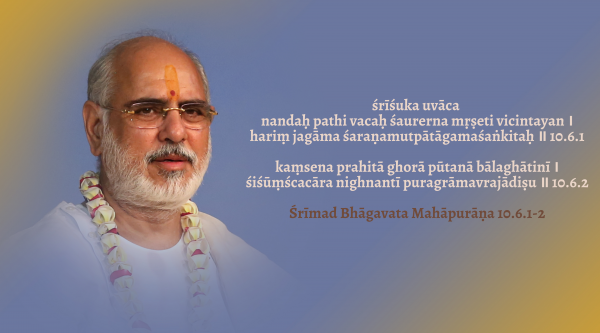Shlok of the Week 20 – Shrimad Bhagavat – 10.6.1-2
Putana Uddhar – Nandbaba Seeks Refuge
Nandbaba seeks refuge as Putana heads towards Gokul
Putana Uddhar

‘The demoness Pūtanā is the personification of Avidyā – spiritual ignorance or lack of
knowledge. She has appeared in an attractive and beautiful guise, but her actions are
terribly malevolent and wicked.’
#Saprem_Harismaran | @PPBhaishri
Nandbaba seeks refuge as Putana heads towards Gokul
Putana Uddhar
śrīśuka uvāca
nandaḥ pathi vacaḥ śaurerna mṛṣeti vicintayan ।
hariṃ jagāma śaraṇamutpātāgamaśaṅkitaḥ ॥ 10.6.1
kaṃsena prahitā ghorā pūtanā bālaghātinī ।
śiśūṃścacāra nighnantī puragrāmavrajādiṣu ॥ 10.6.2
Śrīmad Bhāgavata Mahāpurāṇa 10.6.1-2
श्रीशुक उवाच
नन्द: पथि वच: शौरेर्न मृषेति विचिन्तयन् ।
हरिं जगाम शरणमुत्पातागमशङ्कित: ॥ १०.६.१
कंसेन प्रहिता घोरा पूतना बालघातिनी ।
शिशूंश्चचार निघ्नन्ती पुरग्रामव्रजादिषु ॥ १०.६.२
श्रीमद् भागवत महापुराण १०.६.१-२
Nandbaba seeks refuge as Putana heads towards Gokul
Putana Uddhar
Did-You-Know
- Truth fulfils the speech of those who are committed to Truth by thought, word and deed and as such, their words are never merit less. Nandabābā’s great faith in the words of warning by his dearest friend is a testament to the great character of Vasudevaji.
- The code of conduct (Dharma) followed by all righteous people is to seek refuge in the Supreme Lord – as their sole well-wisher – in both good times and bad.
- When Nandbābā is warned of an imminent crisis in Gokula, he immediately takes mental refuge in Lord ShriHari to protect the entire village as well as his newborn.
- Vasudevaji represents a purified mind, and his character is so firmly established in Truth that he inspires trust even in the heart of the sinful, fearful Kaṃsa.


- Śrī Vallabhācāryaji has classified Pūtanā to represent five-fold ignorance (avidyā) comprising of; 1. Rāga (attachment); 2. Dveśa (aversion); 3. Abhiniveśa (fear of death); 4. Asmitā (false ego); 5. Avidyā (false understanding). This veil of ignorance is what causes the eternally pure jīva to believe he is impure (pūta-nā).
- Pūtanā (avidyā or nescience) is also known as “bakī” or the sister of Bakāsura (dambha or hypocrisy). This Avidyā (Pūtanā) is killed first because it is the mother of all malevolence (giving rise to newer demonic tendencies), and the Lord liberates the root cause of evil first and foremost in both his incarnations of Rāma and Krṣṇa.
- In her previous life Pūtanā was ‘Ratnamālā’, the daughter of the great Balī Mahārāja. Seeing the beautiful form of the Lord as Vāmana, she was filled with parental affection towards Him.
- Later, seeing the treachery with which her father was bound by the Virāta form of the Lord, she felt acute enmity.
- The Lord fulfilled her duelling desires of maternal affection and enmity by suckling upon her poison-smeared breast as a mere newborn babe of six days and liberating her from her asura form.

Did-You-Know?
Pūtanā (avidyā or nescience) is also known as “bakī” or the sister of Bakāsura (dambha or hypocrisy).
To learn more about the Lord’s liberation of Pūtanā in a single verse, see the Śrīmad Bhāgavatam 3.25.3
This is the second of three primary city of Śrī Kṛṣṇa’s pastimes, where he performs innumerable pastimes in eleven years whilst honoring three vows – to not cut his hair, to wear no shoes and to wield no weapons.
Click-Here to Listen:
Learn-More about Bali Mahārāja:
Share your answer or a fun-fact in the comments section below……
#ShrimadBhagavat #Mahatmya #ShlokOfTheWeek #SVN_SOW #ScriptureOfLove
Series by Rishi Harshitbhai Shukla – @HarshitbhaiShukla;
Nimishaben Sadhu (India);
Rajeshbhai Purohit (UK).
About this Article
This is a part of an ongoing series to learn a Shlok a week from the Purushottam Maas Shrimad Bhagavat Katha by Pujya Bhaishri Rameshbhai Oza.
We hope devotees are able to savour a few fun facts on these verses with an enhanced interest for the context and divine nuances through this series.
This Article is the 20th in the ‘Shlok of the Week’ Series